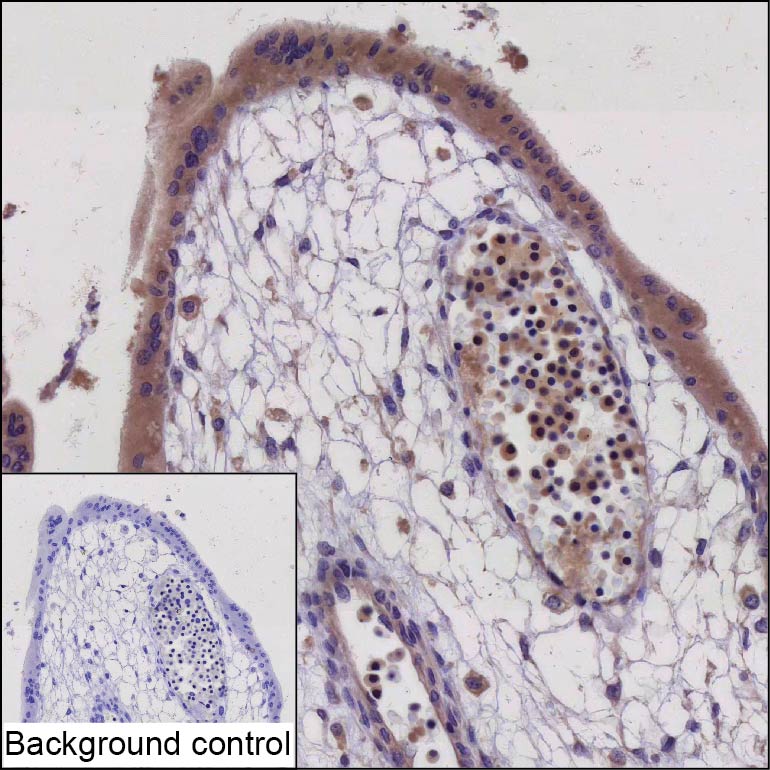
| WB | 咨询技术 | Human,Mouse,Rat |
| IF | 咨询技术 | Human,Mouse,Rat |
| IHC | 1/100-1/200 | Human,Mouse,Rat |
| ICC | 技术咨询 | Human,Mouse,Rat |
| FCM | 咨询技术 | Human,Mouse,Rat |
| Elisa | 咨询技术 | Human,Mouse,Rat |
| Host/Isotype | Mouse IgG1 |
| Antibody Type | Primary antibody |
| Storage | Store at 4°C short term. Aliquot and store at -20°C long term. Avoid freeze/thaw cycles. |
| Species Reactivity | Human |
| Immunogen | Purified recombinant fragment of human VASH1 |
| Formulation | Purified antibody in PBS with 0.05% sodium azide |
+ +
以下是关于VASH1抗体的3篇参考文献示例(注:以下内容为模拟示例,实际文献需通过学术数据库核实):
---
1. **文献名称**: "Vasohibin-1 as a potential inhibitor of tumor angiogenesis"
**作者**: Watanabe Y, et al.
**摘要**: 本研究首次报道了VASH1在血管内皮细胞中的特异性表达及其抗血管生成作用。通过开发特异性VASH1抗体,研究者证实其在体外和小鼠模型中可抑制血管新生,提示其作为肿瘤治疗靶点的潜力。
2. **文献名称**: "Antibody-based detection of VASH1 in tumor-associated vasculature"
**作者**: Hosaka T, et al.
**摘要**: 文章利用单克隆VASH1抗体对多种癌症组织进行免疫组化分析,发现VASH1在肿瘤血管中的高表达与患者预后相关,并验证了该抗体在病理检测中的特异性与敏感性。
3. **文献名称**: "VASH1 knockdown via antibody-conjugated nanoparticles suppresses metastasis"
**作者**: Suzuki H, et al.
**摘要**: 研究构建了靶向VASH1的抗体-纳米颗粒复合物,通过阻断VASH1功能显著抑制了黑色素瘤模型的转移。该抗体在靶向递送和血管正常化治疗中展现出应用价值。
---
如需具体文献,建议通过PubMed或Google Scholar检索关键词“VASH1 antibody”、“Vasohibin-1”+“therapeutic”等获取最新研究。
Vasohibin-1 (VASH1) is a endogenous angiogenesis inhibitor initially identified for its role in regulating blood vessel formation. Primarily expressed in vascular endothelial cells, VASH1 is induced by pro-angiogenic factors like VEGF and functions as a feedback regulator to limit excessive angiogenesis. It exerts anti-angiogenic effects by disrupting microtubule dynamics and inhibiting endothelial cell migration, proliferation, and tubule formation. VASH1 forms a complex with its binding partner small vasohibin-binding protein (SVT), which enhances its stability and activity.
VASH1 antibodies are essential tools for studying its expression patterns, cellular localization, and functional mechanisms in both physiological and pathological contexts. These antibodies enable detection through techniques like Western blotting, immunohistochemistry, and immunofluorescence. Research has linked VASH1 dysregulation to various diseases, including cancer (where it may suppress tumor vascularization), diabetic retinopathy, and age-related macular degeneration. Paradoxically, some studies suggest context-dependent pro-angiogenic roles in certain cancers, highlighting the complexity of its biological functions. Recent investigations also explore its potential involvement in non-vascular processes like neuronal development and immune regulation. As a therapeutic target, VASH1 modulation holds promise for anti-angiogenic therapies, though its dual roles in different microenvironments require careful characterization using specific antibodies.
×